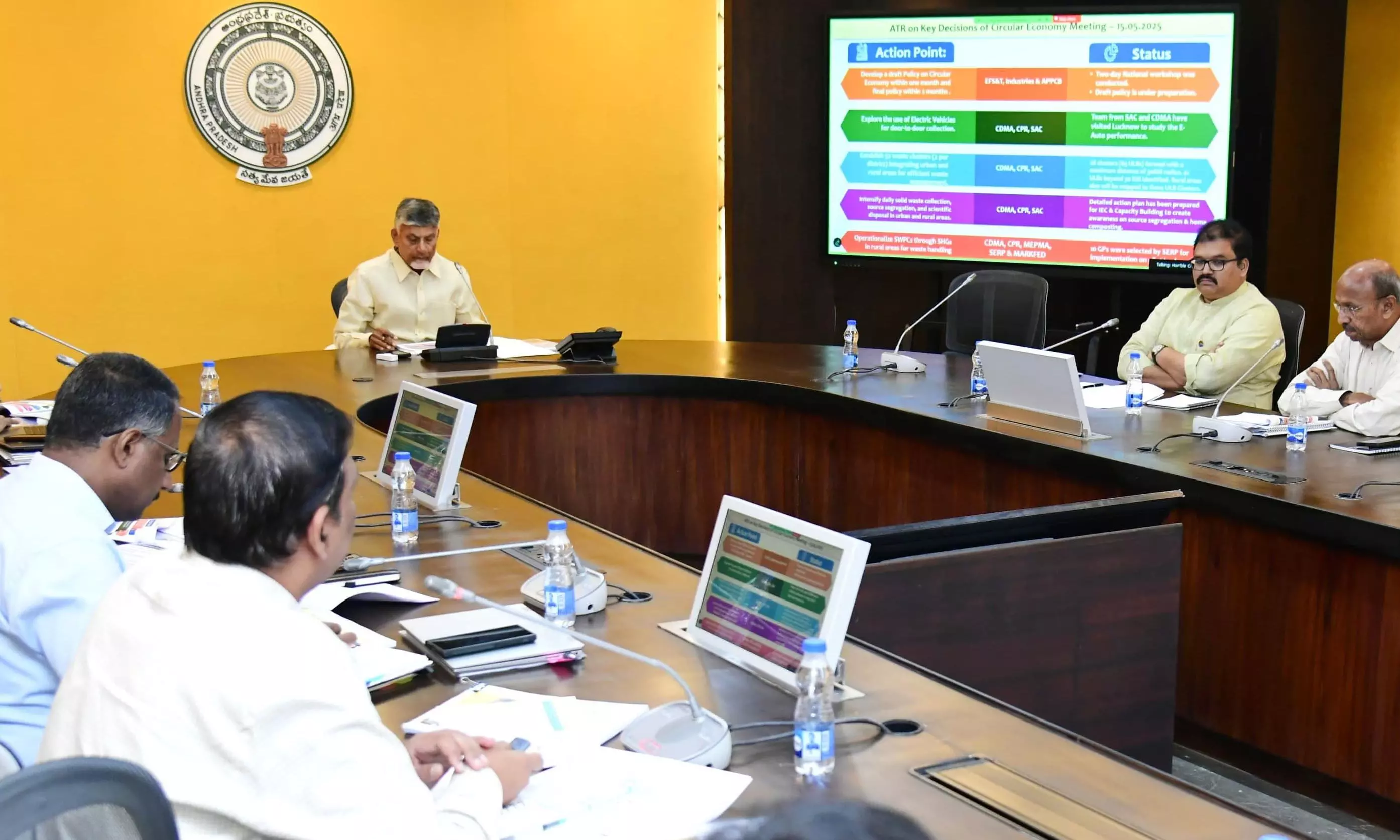Single-use Plastics to be Banned in 17 Municipal Corporations: CM Naidu
Naidu said 157 Reduce-Reuse-Recycle centres must be established across 87 urban locations

Vijayawada: With a view to strengthening the waste management system in Andhra Pradesh, Chief Minister N. Chandrababu Naidu has directed officials to frame a new policy on the circular economy within two months.
Naidu proposed that three circular economy parks be established in different regions within a year. There must be increased deployment of modern machinery in waste-to-energy plants.
The Chief Minister was speaking at a review meeting he held with officials on Tuesday on circular economy strategies. The discussions focused on wealth creation from waste and the reuse of resources. Proposals from the Material Recycling Association of India on the establishment of circular economy parks were also reviewed.
Naidu said, “By October 2 this year, single-use plastics should be completely banned in four major cities -- Visakhapatnam, Vijayawada, Tirupati and Rajahmundry as also in 17 other municipal corporations. He called for increased use of cloth bags in these areas.
He said 157 Reduce-Reuse-Recycle centres must be established across 87 urban locations.
Naidu also ordered the immediate clearance of legacy waste. He sought an action plan on waste segregation and recycling, which should be submitted within 90 days. “In the first phase, a park will be set up on 400 acres in Visakhapatnam on international standards. We must study how similar parks were set up in other countries and try to attract significant investments through these initiatives.”
Naidu directed officials to formulate a comprehensive plan focusing on 11 sectors identified by the central government under the circular economy framework: municipal waste, vehicles, lithium batteries, gypsum, tyres, rubber, electronics, agriculture, industry and aqua waste.
Additionally, he said, the departments of mining, handlooms and animal husbandry also be included. Urban and rural local bodies should strive to achieve the goal of zero waste.
To encourage best practices, he proposed that 'Swachhta' awards be introduced from October 2 next year for individuals and institutions demonstrating excellence in waste management. The awards will be distributed across categories such as local bodies, self-help groups, anganwadis, schools and colleges, bus stands, hospitals, NGOs and other organisations.
The officials told the Chief Minister that 52 waste clusters have been established so far, two in each district, covering all the urban and panchayat areas. A year, AP generates 36,588 tonnes of battery and automotive waste, 61,996 tonnes of plastic and PET bottle waste, 23,928 litres of engine and hydraulic oil waste, and 59,654 metric tonnes of tyre and rubber waste.
Agriculture, they said, contributes over 4 million metric tonnes of waste annually, while the livestock, aqua and poultry sectors together generate 34.7 million metric tonnes. In rural areas, 1,329 metric tonnes of waste is generated daily from 8.8 million households. Officials also cited the incentives being provided for circular economy initiatives in Rajasthan, Karnataka and Maharashtra and said these could be done here too.
The Chief Minister said, “Effective implementation of the circular economy model in AP could boost the state’s GSDP by an estimated Rs. 15,000 crore annually. Additionally, this would allow the manufacturing sector to supply materials worth Rs.10,000 crore. This value addition would help generate an income of Rs.3,000 crore annually in GST revenue to the state exchequer.”
Such an initiative could also provide direct employment for 100,000 people and support 10,000 micro-entrepreneurs, indirectly providing livelihoods to over 1 million individuals, the CM added.

